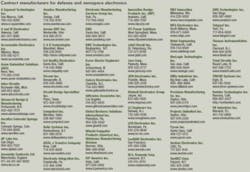By John Keller
Military and aerospace prime systems integrators, such as Boeing, Lockheed Martin, Northrop Grumman, and Raytheon, are catching on to a business reality that the commercial industry has known for years-outsourcing electronic systems manufacturing can save time, money, and a lot of headaches.
Defense contractors increasingly are seeking the help of electronics and electro-optics outsourcing manufacturers, yet often shy away from contract manufacturing to the relative high degree of their commercial counterparts.
“We still see a desire of primes to reduce costs or improve schedule by outsourcing,” says Dave Williams, president of contract manufacturer Sechan Electronics Inc. in Lititz, Pa.
Prime contractors that have chosen to outsource systems or systems, as opposed simply to components like printed circuit boards, “are probably my happiest customers,” Williams says. “When they get it, it’s done; they can just ship it.”
Speed of manufacture and quick time to market also are attractive potential benefits of using contract manufacturers. “We are a quick turn-quicker turn than a lot of the primes can be,” says Timothy Allen, president of TRICOR Systems Inc. in Elgin Ill.
“We have lower cost than they have,” Allen continues. “We have an engineering staff as well, so we can help with any kind of manufacturing process. We will offer suggestions and solutions to the problem, and that is where we really excel.”
Despite the marquee attributes of contract manufacturing, the prime electronics systems integrators still are tentative about embracing this approach.
“There was a dramatic outsourcing migration over the last 10 years across the whole industry, yet in the mil/aero area they are lagging somewhat,” says Bob Bauer, regional sales manager for Aeroflex Colorado Springs in Colorado Springs, Colo., which specializes in manufacturing defense and aerospace printed circuit boards.
“We still have a lot of customers building in-house, and who are doing only a portion of their business in contract manufacturing,” Bauer says. “Most primes still have substantial in-house capability.”
Many prime contractors seek to retain their in-house manufacturing capability to protect jobs and to retain domestic manufacturing capability in case of national emergency. Bad experiences in the past with contract manufacturers also may play a role.
“Traditionally there were attempts in the past to outsource,” Bauer says. The difficulty with commercial contract manufacturers is they are very good at building large numbers of a smaller mix of systems. They are geared to build large quantities, while we are geared to build a modest number of a higher mix of assemblies.”
Despite the reservations of prime contractors, contract manufacturers insist that there are more reasons than ever to outsource much of electronic and electro-optic manufacturing.
“Our business is to do the systems and subsystems. People outsourcing circuit boards only are missing an opportunity,” says Sechan’s Williams. “It makes a lot of sense to us in terms of getting a fully tested, ready-to-ship product. They can control their product costs and hidden administrative costs by contract manufacturing at the system level rather than the circuit board level.
“The benefits derive from the fact that all cards must work together in the subsystem,” Williams continues. “If it fails at my facility, the rework required to make the subsystem play is all done at the same location. But if I send circuit cards to a prime contractor’s facility in another state, the first impression they have is the circuit boards are bad, where it might be a system tolerance stackup issue, best solved right at the manufacturing source.”
Finding the right contract manufacturer can be a challenge, but certainly can be worth it in the long run-particularly where documentation, traceability, and import/export regulations are concerned.
“The trend for contract manufacturing in commercial applications is to offshore that business; a lot is done in China and other areas,” says Aeroflex’s Bauer. “But for the military they often are unable to take it out of the country because of export regulations. They have trouble finding contract manufacturers that meet the high-end standards, such as the IPC class 3 manufacturing workmanship requirements.”
Military and aerospace systems also have much more demanding oversight and documentation requirements than the commercial applications do, Bauer says. “They require very diligent record keeping, which would be inefficient for a large-volume manufacturer.”
Contract manufacturing itself remains a moderate-growth industry, often tied to trends in the U.S. defense budget and to moment-to-moment needs of the prime systems integrators. “Our business is 100 percent military and aerospace, and mostly contract manufacturing. Business is stable and steady, and will no doubt follow the budgets in years to come,” says Sechan’s Williams.
“We had substantial growth last year in the circuit card assembly area,” Bauer says. “The general trend is fairly static or growing slowly, but the percentage of being outsourced continues to grow. The trend is to find competent outside partners to do the circuit card assembly and manufacturing.”
Not all contract manufacturers see growth in their futures as evidence mounts that U.S. defense budgets will remain flat or even decline in future years. “Our business has actually gone down a bit over the past year or so,” says TRICOR’s Allen.
“The military side of our business is down, and two years from now I see the military going in the wrong direction as far as our business is concerned,” Allen continues. “With a Democratic Congress, I see defense spending going down. Our business really just depends on what contracts come through.”
null

